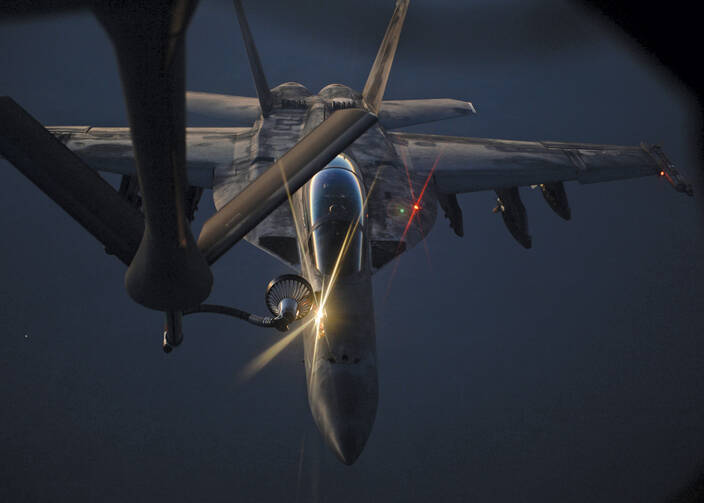Listening to President Obama’s speech on Sept. 10, outlining his administration’s purportedly new strategy for defeating Islamic State militants in Iraq and Syria, David Cortright found himself wondering what, if anything the United States has learned from its long and costly involvement in the region. Cortright, the Director of Policy Studies at the University of Notre Dame’s Kroc Institute for International Peace Studies, heard the president detail a plan to “degrade, and ultimately destroy, [ISIS] through a comprehensive and sustained counter-terrorism strategy.” The president’s plan includes air strikes against ISIS targets and may mean the arming of Syrian opposition forces now fighting against both ISIS and the Assad regime, while shoring up a third, presumably moderate force in the complex Syrian civil war.
On arming opposition fighters, Cortright pointed out that the United States should understand by now what can happen when the weapons it brings into a conflict end up in the wrong hands. Many of the most destructive pieces of equipment now deployed by ISIS fighters were seized from fleeing Iraqi soldiers, who abandoned advanced weapons, tanks and armored humvees that had been provided by the United States. And in the not-too-distant past U.S. agents have had to buy back weapons on the black market after they fell into the wrong hands after U.S. intelligence agents armed the mujahedeen in Afghanistan. Nor has the United States proved capable of creating a self-sustaining moderate political movement in Iraq despite great effort there over a decade. Cortright worries that a moderate middle in Syria will likewise prove a mirage. “It’s way too late to start that now,” he said.
But the overall problem with the administration’s strategy to turn back the ISIS threat, he argues, is that it once again relies mostly on military force to solve what are primarily political problems. Many of the Sunni tribal people in northern Iraq currently supporting ISIS have elected to do so because they have become deeply pessimistic about their future in a nation that has been directed by Shiites since the fall of Saddam Hussein. Their treatment under the Maliki Shiite-dominated government has especially not been good, he points out; Sunni grievances are real and they remain unresolved. Military force alone will not be capable of defeating Islamic terrorist movements, he said, when they can find sustenance from disaffected locals.
Sunnis in the region, he points out, have been under brutal assault from both Assad and Baghdad. “The Sunni population feels under siege. Some of them are turning to ISIS, beginning to see working with ISIS as a lesser of two evils.” Cortright adds that he is concerned that President Obama may be “too quick to judge the new government as inclusive.
“When the United States, especially, uses force against them, it only stirs up more hatred and drums up more support for their effort,” Cortright said. “It is counterproductive and a lot of data can support that.” A truly winning counterinsurgency strategy, he argues, must take into account the often complicated underlying political conditions driving the conflict and include creative diplomatic moves, like working with unlikely allies such as Iran and robust economic sanctions aimed at closing off funding sources such as oil sales.
Which is not to say that the use of force cannot sometimes be completely justified. Cortright points out that the military may be required to protect vulnerable, imminently threatened groups, as was recently the case when Yazidi, Turkmen and Christian villagers were targeted by ISIS. At such times, the president’s plan to attack ISIS forces may mesh with Pope Francis’ recent call for appropriate countermeasures to the extremist group. “In these cases, where there is an unjust aggression, I can only say that it is licit to stop the unjust aggressor,” the pope said on Aug. 18.
“He made it clear that he was not referring to bombing or to war,” said Cortright. “The use of force is justified and even necessary if it can save innocent people from being killed, but that does not justify bombing as a policy or engaging in warfare as a policy.”








